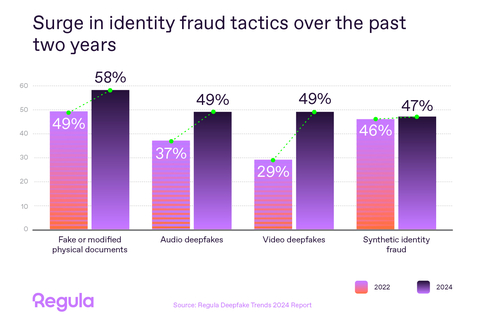Deepfake Fraud Surges: 49 Percent of Businesses Hit by Audio and Video Scams, Regula Survey Finds

In 2024, every second business globally reported incidents of deepfake fraud, revealing a growing trend in AI-related crimes over the past two years. Meanwhile, fraud involving fake or modified documents now outpaces AI-generated scams. These are the first findings from a new survey* “The Deepfake Trends 2024” commissioned by Regula, a global developer of forensic devices and identity verification solutions.
Regula’s survey data shows a significant rise in the prevalence of video deepfakes, with a 20% increase in companies reporting incidents compared to 2022**. While 29% of fraud decision-makers across Australia, France, Germany, Mexico, Turkey, UAE, UK, and the USA reported encountering video deepfake fraud in 2022, this year’s data — covering the USA, UAE, Mexico, Singapore, and Germany — shows this figure has surged to 49%. This sharp increase across the revised cohort underscores the growing challenge of video deepfakes and their continued threat to businesses.
Also Read: 5 Things to Know About Observability for Industrials, Materials, and Manufacturing
Audio deepfakes are also on the rise, with a 12% increase compared to 2022 survey data.
The survey also reveals industrial and regional differences regarding companies’ experience with deepfake threats. For example, audio deepfakes prevail over video ones among the three of the surveyed sectors, including Financial Services (51%), Aviation (52%), and Crypto (55%). At the same time, Law Enforcement (56%), Technology (57%) and FinTech (57%) are reporting more face video scams.
The UAE and Singapore show higher susceptibility to deepfake fraud, with 56% of businesses in the UAE experiencing video deepfakes and 56% of businesses in Singapore encountering audio deepfakes. This is above the global average. In contrast, Mexico reported the lowest impact, with only 35% and 38% of businesses encountering video and audio deepfakes, respectively.
Old threats still persist
While video deepfakes are seeing the biggest jump over the two-year period (+20%), all other identity-related fraud has also grown, and some of its forms are more common than AI-generated scams.
As Regula’s survey shows, 58% of businesses globally have experienced identity fraud in the form of fake or modified documents. This happens to be the top identity fraud method for Mexico (70%), the UAE (66%), the US (59%), and Germany (59%). This implies that not only do businesses have to adapt their verification methods to deal with new threats, but they also are forced to combat old threats that continue to pose a significant challenge.
Interestingly, in a country more exposed to deepfakes, Singapore, this “traditional” threat is much lower than in the world at large: only 43% of businesses there reported having dealt with fake or tampered IDs.
“Our latest survey demonstrates that AI-generated identity fraud has become an everyday reality. The surge in deepfake incidents over the two-year period of our survey leaves businesses no choice but to adapt and rethink their current verification practices. Deepfakes are becoming increasingly sophisticated, and traditional methods are no longer enough. What we think may work well is the liveness-centric approach, a robust procedure that involves checking the physical characteristics of both individuals and their documents; in other words, verifying biometrics and ID hardcopies in real-time interactions. This is what we adhere to in our R&D and what we recommend that our customers do to protect themselves,” says Ihar Kliashchou, Chief Technology Officer at Regula.
Stay tuned for further insights as we continue to analyze and release more data on deepfake fraud. We’ll provide key updates to keep you informed and prepared for emerging threats.
Also Read: AiThority Interview with Rev Lebaredian, VP of Omniverse and Simulation Technology at NVIDIA
Additional resources:
- 2022: One-Third of Global Businesses Already Hit by Voice and Video Deepfake Fraud
- 9 Identity Verification Trends Shaping 2024 for Forward-Thinking Businesses
- What Is Liveness Detection?
*The research was initiated by Regula and conducted by Sapio Research in August 2024 using an online survey of 575 business decision-makers across the Financial Services (including Traditional Banking and FinTech), Crypto, Technology, Telecommunications, Aviation, Healthcare, and Law Enforcement sectors. The respondent geography included Germany, Mexico, the UAE, the US, and Singapore.
**After aligning the 2024 survey data with the 2022 cohort for a direct comparison, it reveals that 49% of companies experienced both audio and video deepfakes, up from 37% and 29%, respectively, in 2022. However, the unadjusted 2024 survey — which includes a larger sample size and new regions such as Singapore, in place of countries like Australia and Turkey — indicates that 50% of companies were affected by both types of deepfakes.
[To share your insights with us as part of editorial or sponsored content, please write to psen@itechseries.com]

Comments are closed.